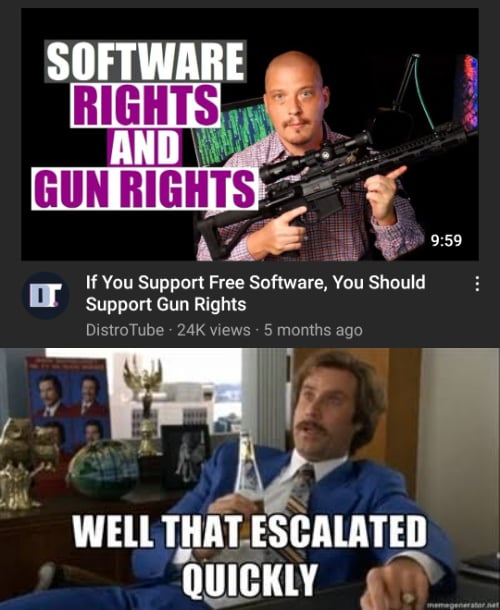this post was submitted on 18 Mar 2024
1054 points (96.6% liked)
linuxmemes
21263 readers
591 users here now
Hint: :q!
Sister communities:
- LemmyMemes: Memes
- LemmyShitpost: Anything and everything goes.
- RISA: Star Trek memes and shitposts
Community rules (click to expand)
1. Follow the site-wide rules
- Instance-wide TOS: https://legal.lemmy.world/tos/
- Lemmy code of conduct: https://join-lemmy.org/docs/code_of_conduct.html
2. Be civil
- Understand the difference between a joke and an insult.
- Do not harrass or attack members of the community for any reason.
- Leave remarks of "peasantry" to the PCMR community. If you dislike an OS/service/application, attack the thing you dislike, not the individuals who use it. Some people may not have a choice.
- Bigotry will not be tolerated.
- These rules are somewhat loosened when the subject is a public figure. Still, do not attack their person or incite harrassment.
3. Post Linux-related content
- Including Unix and BSD.
- Non-Linux content is acceptable as long as it makes a reference to Linux. For example, the poorly made mockery of
sudoin Windows. - No porn. Even if you watch it on a Linux machine.
4. No recent reposts
- Everybody uses Arch btw, can't quit Vim, and wants to interject for a moment. You can stop now.
Please report posts and comments that break these rules!
founded 1 year ago
MODERATORS
you are viewing a single comment's thread
view the rest of the comments
view the rest of the comments

You do have some errors in your little rant. While firearms are easier to acquire in the US as a rule, there are still some restrictions and forms you need to fill out. Plus there can be a near byzantine set of laws that each state and even cites can pass to further restrictions on purchase and ownership. It might be the biggest issue about firearms ownership that there are few national laws for enforcement. It's mostly up to each state and city regulations and enforcement.
Convicted felons are pretty much barred from firearms ownership across the US. The only real exceptions might be a billionaire who can buy anything. Or perhaps it's just easier to pay some else to shoot people for them.
Everyone has to fill out a Form 4473 which is a universal federal background check against a data base to see if you can legally own a firearm. It is an electronic background check done at the time of sale and transfer. It can take a few minutes or a few hours to get done. And you can be disqualified for a simple misspelling or even if your name is similar to a some who is barred from purchase. Then it's up to you to get your name cleared. All and any firearms purchases through a dealer MUST have a Form 4472 attached. And the dealer must keep a record after the sale for a fairly long period of time. A good number of states have further restrictions and requirements on the purchase and ownership of firearms. Which require further state background checks and issuance of a special card to buy a firearm. And individual cities can impose further restrictions yet.
Minors, under 18 years of age, (a few are 21), in the majority of states cannot legally buy a firearm. And are generally only allowed to handle or use a firearm with an adult present - some exceptions would be during a hunting season and only when hunting. But even then, there will be an adult somewhere around.
Carrying a handgun publicly, with the exception of a very small number of states, is very controlled. Some states, like California or New York are quite restrictive to the point that pretty much only wealthy people can actually afford to pay for all the hoops you might need to jump through to get such a permit. A tiny number of states, like Texas allow for common carry laws without a permit, (often called Constitutional Carry). But the majority of states require that you have taken a special class and then go through more special background checks by local law enforcement to get the permit issued. And these permits require renewals every few years with more background checks every time.
Again, I think the biggest issue is the lack of a uniform national set of laws and requirements for firearms purchase and ownership is what confuses everyone. States are considered to have most of the power to make many laws that the federal government can't over ride. Sometimes this is a good thing and sometimes not so good perhaps. But it's the system we have for better or worse.